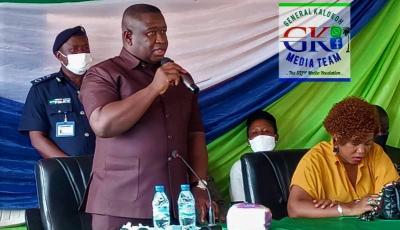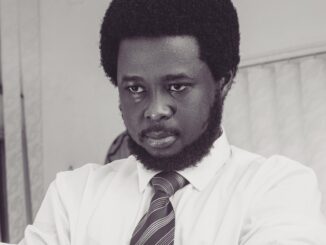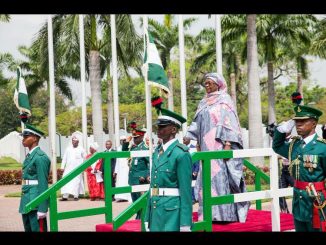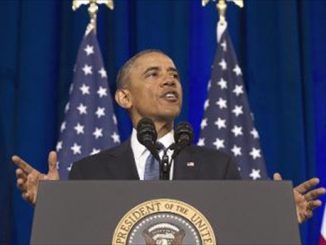
The Bio administration and the future they promise
By: Jaime Yayah Barrie
In the last three years since coming to power, President Bio and his team have constantly talked about laying the foundation for a better Sierra Leone. They tell citizens the need for patience urging us to “trust the process” because the impact of what they are doing now, they say, lies in the future. And as citizens, whether promised or not, we definitely will see the impact in either a good or bad way when the time comes.

We can already foresee a dreadful future through some of his current actions. Except for education, many of his actions are utterly different from what his administration promises us, and the impact will be beyond what we are currently experiencing. Except for the foundation he’s laying for the country’s education which I believe, if we manage to make it sustainable, it will without any doubt be one of the most radical approaches we have ever taken as a nation. But that’s just for education.
There are issues around accountability and the rule of law that seem blurry unseemly. The President must understand that abolishing the death penalty and the criminal libel bill should be beyond mere pronouncements. It is the same way many of his actions contradict his call for national cohesion and a united Sierra Leone.
Talks about accountability are meaningless if Bio as President feels he’s not accountable to us as citizens. Issues like his numerous travels and per diems are critical. He must, as President, tell citizens why the frequent travels, who he travels with, who sponsors/finances the trips, the amount spent (including how much he and his delegation receive as per diem during such trips), the expected outcome of every trip and what the country stands to benefit.
These are essential things to account for and to make the information public.The President’s so-called fight against corruption means ABSOLUTELY NOTHING if the only people the anti-corruption commission tends to charge for corruption or misappropriation of public funds are either people from the opposition or those who fall out of favor with his wife and others in his close circle. Talks about the rule of law will start making sense when ministers, police officers, and other government appointees are not just suspended for instigating violence and killing innocent citizens but are charged to court and held accountable for their actions.
So far whether it’s about police officers killing protesters (like in Lunsar and Makeni), coldblooded murders by the same police (like the shooting in Hastings), or members of the Presidential guards making videos threatening to massacre citizens; the response from the government has been limited only to press releases with fake promises of “suspending perpetrators while investigating” the issues. There have been no actions beyond the press releases, at least not to public knowledge.
Abolishing the death penalty is good, but what would be great is taking actions that would also protect prisoners’ rights and hold people accountable for violating those rights.
The Pademba Road prison massacre is one clear example. Until today, we still don’t know who or what caused the prison riot, the exact number of prisoners murdered by security forces, the identity of those murdered, where they were buried, whether their families were informed about their deaths and what form of compensation, if any, will the government provide to the victims’ families. What good will it make if, as a country, we abolish the death penalty yet turn a blind eye on issues like that unfortunate April 29, 2020 prison massacre? Are we abolishing the death penalty only to have the prisoners massacred by those who are supposed to protect them? Where are we on the cases involving people who were locked up and never for once appeared in court for trial?
We have dozens of people locked up for charges they are innocent of or even if guilty they would have served shorter sentences but end up spending a lifetime in prison because their files disappeared in court or never had the opportunity to have a fair trial. President Bio’s calls for national cohesion haven’t yielded any good results because he probably doesn’t believe in it or is the worst at uniting people.
The evidence is apparent in almost all of his public appearances and functions he attends, where the only ones he goes to and the people seated next to him are his praise-singers and those in his close circle.
Basita Michael said during the Bintumani 3 conference on democratic consolidation for peace and national cohesion dialogue that “all the long-standing problems still entrenched in our society, we have added another problem, which is making things even worst.” Where are we on those recommendations made during that conference? It’s impossible to achieve national cohesion if the President is not serious about it and continues to surround himself with his “yes sirs” while undermining the very institutions that could help bridge the gap in our national cohesion dialogue.
Another critical aspect to note is the administration’s response to the country’s challenge in food security. It’s sad to hear government officials telling all citizens to “go farm” each time people point out the administration’s failure to tackle Sierra Leone’s food security problem. The government keeps telling everyone to go and establish farms yet hardly provides incentives to the country’s existing farmers. Sierra Leone does not lack farmers. What the country lacks are proper systems to support farmers. If we want to make farming attractive to citizens, we must first make it sustainable to those local farmers already in the business.
Many of the government’s puppets blame young people for leaving the villages for bigger cities yet fail to admit the lack of support to those who, for years and despite the enormous challenges they face, have never left their villages and are still engaged in farming. To invite everyone to engage in agriculture is to first talk about the lack of support for the existing farmers.
And talking about farms, where is the rice from the President’s farm? Didn’t he and some of his ministers cultivate huge farms? Their produce from last year and the year before that, where did they sell them? Was it within the communities where they farmed? Around the country or to specific groups/organizations? It would be great to know. So, if the President intends to lay a good foundation for Sierra Leone, he must first ensure he starts practicing what he wants us tomorrow. And let there be a visible foundation for citizens to see.
Do they want to fix the country’s health sector entirely? How about they start by upgrading just one hospital so we will have just “one sober hospital” for now? Do they want to fix the country’s electricity problem? Start with improving electricity in one city and move on to the next. Do the same for water and other significant areas.Projects like building the Lungi bridge may not be the country’s priority, but if he thinks it’s essential to have the bridge, start building it. If the investors back out for obvious reasons, be honest about it and let citizens know they back out and that the administration is looking for some other investors to fill in.
For three years, the administration has kept announcing the commencement of projects only to go silent afterward with no further information on why the projects didn’t happen. Citizens might be willing to sacrifice today for a better tomorrow, but only if they see actions pointing towards that direction. Tok n Do shouldn’t be just words on shinning billboards displayed on every street corner. Let your Tok n Do be visible projects. If u dae soak da grun for da future do ya leh we see da potoh potoh.



